If you’re new to trailers, then you might have gone through the most common problem selecting the right one—and guess what? You are not alone.
From hauling cars to hauling mulch, from moving ATVs to moving construction equipment, each trailer is designed for a different purpose. And picking the wrong type? That’s how you end up wasting money or worse—damaging your cargo.
No worries, we are here to make your task easy.
In this blog, you’ll get to know about the most common types of trailers, what they’re used for, and how to know which one’s right for your job:
Most Common Types of Trailers and Their Uses
When it comes to hauling, transporting, or running a mobile business, choosing the right trailer makes all the difference. From simple utility trailers to specialized mobile vending units, there are many types of trailers designed for different needs. Below, we’ve outlined the most popular options, their ideal uses, and the pros and cons to help you pick the perfect one.
1. Utility Trailers
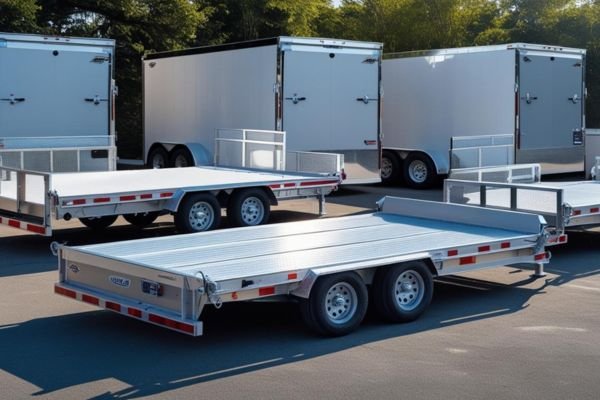
Utility trailers are among the most versatile types of trailers. They are open, lightweight, and perfect for hauling landscaping tools, small equipment, or home improvement supplies. Their simple design makes them easy to tow, hitch, and maneuver, making them a favorite for homeowners and handymen who need a practical, cost-effective hauling solution.
Pros:
- Affordable and budget-friendly
- Lightweight and easy to tow
- Quick to hitch/unhitch
Cons:
- Exposed cargo (no weather protection)
- Not suitable for heavy equipment
Best For: Landscapers, DIY homeowners, handymen
Also Read: Utility Trailer Uses
2. Enclosed Cargo Trailers
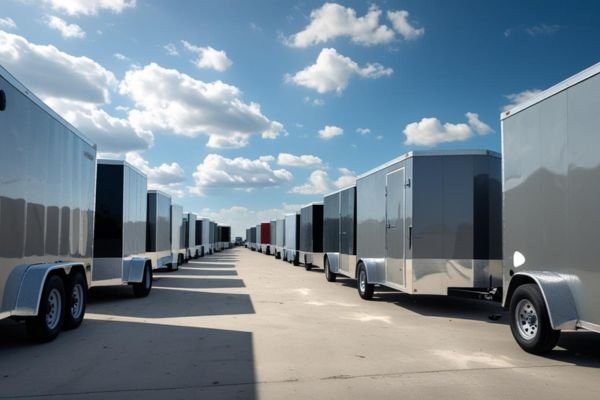
Enclosed cargo trailers are like mobile garages. These types of trailers are designed to keep your belongings safe from theft, weather, or road damage. They’re perfect for transporting valuable items, moving businesses, or even converting into mobile shops or offices. With their lockable structure and branding potential, they provide both protection and professionalism.
Pros:
- Complete weather and theft protection
- Excellent resale value
- Customizable for business branding
Cons:
- Higher purchase cost
- Heavier to tow
Best For: Contractors, movers, food vendors, musicians
3. Dump Trailers
Dump trailers are heavy-duty types of trailers equipped with hydraulic lifts to unload soil, gravel, or demolition debris with ease. Instead of shoveling or unloading by hand, the tilting bed saves time and effort. Ideal for construction, landscaping, and junk removal, they’re built for tough jobs where efficiency is key.
Pros:
- Hydraulic lift for fast unloading
- Extremely durable
- Perfect for heavy-duty hauling
Cons:
- Expensive investment
- Requires regular hydraulic maintenance
Best For: Landscapers, junk removal, construction crews
4. Car Hauler Trailers
Car hauler trailers are flatbeds specifically designed to transport vehicles safely. These types of trailers come in both open and enclosed designs, depending on the level of protection required. They feature low decks and wide ramps to make loading vehicles smooth and secure, which makes them essential for auto businesses and towing services.
Pros:
- Low deck height for easy loading
- Sturdy frame and ramps
- Built specifically for vehicles
Cons:
- Limited use (mainly for vehicles)
- Enclosed versions are costly
Best For: Auto dealers, race teams, towing companies
5. Equipment Trailers
Equipment trailers are rugged types of trailers built to handle heavy machinery such as tractors, bobcats, or skid steers. They come with reinforced frames, heavy-duty axles, and strong ramps for loading. Farmers and contractors rely on them when moving large, expensive equipment that requires reliable support and durability.
Pros:
- High weight capacity
- Strong axles and frame
- Often includes heavy-duty ramps
Cons:
- High upfront cost
- Needs a powerful tow vehicle
Best For: Construction crews, contractors, farmers
6. Gooseneck Trailers
Gooseneck trailers are among the most stable types of trailers for hauling heavy and oversized loads. Unlike bumper pull trailers, they attach over the pickup truck bed, providing tighter turning and better weight distribution. Their superior stability makes them essential for hauling in industries like farming, oilfields, and long-distance heavy transport.
Pros:
- Excellent stability and balance
- Handles heavy, long loads easily
- Reduces trailer sway
Cons:
- Requires a gooseneck hitch
- Occupies truck bed space
Best For: Farms, oilfields, heavy-duty hauling
7. Tilt Trailers
Tilt trailers are unique types of trailers with a hydraulic or gravity-tilt deck that eliminates the need for ramps. They’re designed to simplify loading wheeled equipment or low-clearance machines. With easier one-person operation, they provide convenience and safety for landscapers, equipment movers, and construction professionals.
Pros:
- No need for ramps
- Safer, easier loading
- Good for solo operators
Cons:
- Higher cost
- Hydraulic mechanisms need upkeep
Best For: Landscapers, equipment haulers, construction crews
8. Flatbed Trailers
Flatbed trailers are open-deck types of trailers used for oversized or irregular loads like lumber, pipes, or large machinery. Their open design allows for side or top loading, making them the go-to option for logistics and construction industries. While they lack cargo protection, they’re unbeatable for large, awkward freight.
Pros:
- Carries oversized/irregular cargo
- Easy to load from sides or top
- Strong and durable design
Cons:
- No weather or theft protection
- Requires proper tie-downs
Best For: Logistics companies, construction, agriculture
9. Livestock Trailers
Livestock trailers are specialized types of trailers designed to move animals safely and humanely. They feature ventilation, sturdy dividers, and easy-to-clean interiors to ensure comfort and hygiene. Farmers and ranchers rely on them to transport cattle, horses, goats, and other animals securely.
Pros:
- Built specifically for animal transport
- Ventilated and animal-friendly design
- Easy to clean and sanitize
Cons:
- Limited use (animals only)
- Needs frequent sanitization
Best For: Farmers, ranchers, animal haulers
10. Specialty Trailers
Specialty trailers are custom-built types of trailers for unique purposes such as food trucks, mobile grooming, vending units, or mobile offices. They are highly customizable and often act as business-on-wheels. While they are the most expensive option, they allow entrepreneurs to take their services anywhere with a professional look.
Pros:
- Fully customizable for businesses
- Mobile branding opportunity
- Professional appearance
Cons:
- Most expensive option
- Must meet local regulations (health/safety codes)
Best For: Food vendors, mobile businesses, creative entrepreneurs
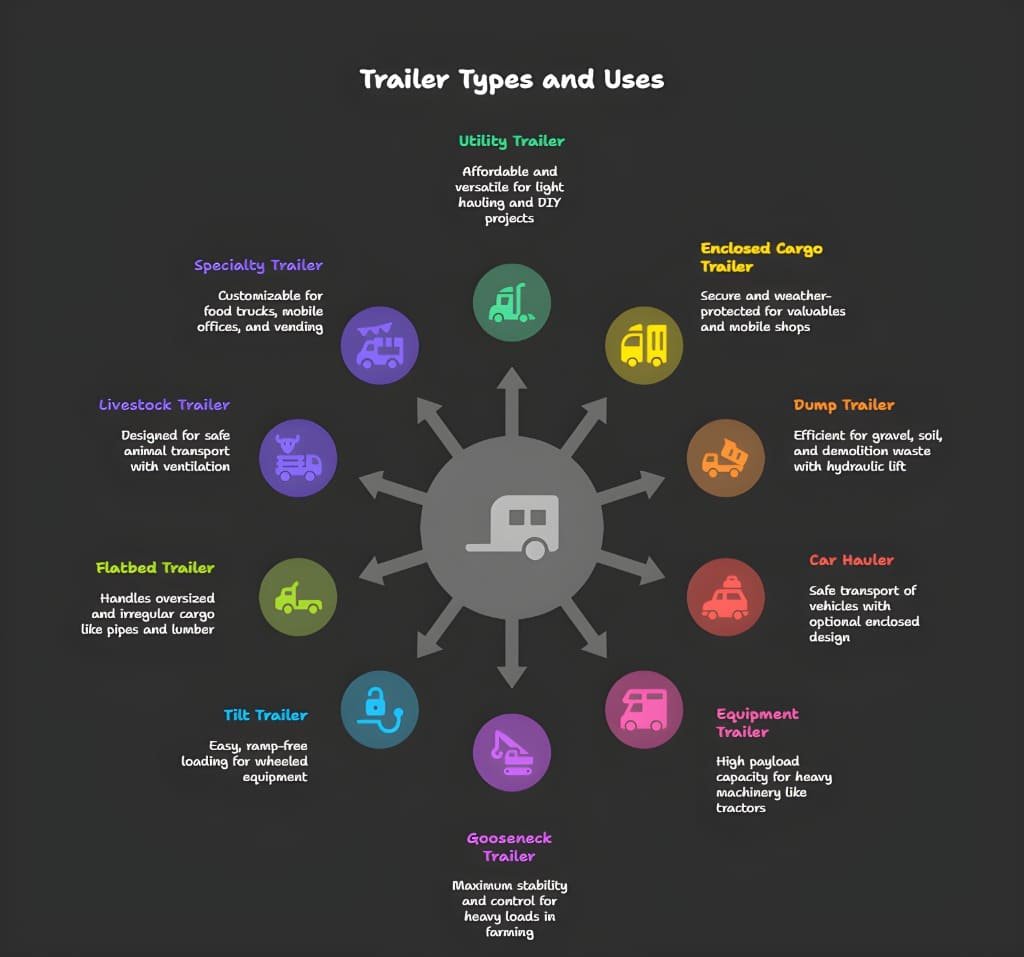
How to Choose the Right Types of Trailer for Your Industry?
Now that you know the main types of trailers, the next step is choosing the one that best fits your needs. Think of this as your trailer matchmaking guide. Just like you wouldn’t wear hiking boots to a wedding, you shouldn’t use a dump trailer when what you really need is an enclosed cargo hauler.
Let’s walk through different industries, what they typically require, and how to identify the perfect trailer for the job.
1. Construction & Contracting
What you need: Durability, high payload, and multi-purpose functionality.
Best Types of Trailers:
- Equipment Trailers – for hauling skid steers, backhoes, compactors
- Dump Trailers – for gravel, soil, and debris removal
- Flatbed Trailers – for lumber, pipes, or oversized materials
What to look for:
- 10,000+ lb payload capacity
- Heavy-duty axles and brakes
- Built-in ramps and tie-downs
- Weather-resistant coating to prevent rust
Common mistake: Choosing a trailer that’s too small for heavy equipment. Always account for machine weight plus attachments.
2. Farming & Agriculture
What you need: Versatility, animal safety, and rugged construction.
Best Types of Trailers:
- Gooseneck Trailers – for large hay bales and machinery
- Livestock Trailers – for cattle, pigs, goats, and horses
- Flatbed Trailers – for transporting feed, seed, and fencing
What to look for:
- Ventilation and easy-to-clean flooring for livestock
- Side rails and tie-down points for produce or equipment
- Strong suspension to handle rough terrain
Common mistake: Overloading basic utility trailers with heavy farm gear, which leads to faster wear and tear.
3. Landscaping & Outdoor Services
What you need: Easy loading, flexibility, and organized tool storage.
Best Types of Trailers:
- Utility Trailers – for mowers, mulch, and hand tools
- Dump Trailers – for quick unloading of soil or gravel
- Tilt Trailers – for ride-on mowers and wheeled equipment
What to look for:
- Mesh sides or built-in tool racks
- Folding ramps for smooth loading
- Tandem axles for heavier loads
Common mistake: Ignoring trailer height. Too tall makes loading difficult, too short limits storage.
4. Moving, Delivery & Logistics
What you need: Enclosed space, security, and protection from weather.
Best Types of Trailers:
- Enclosed Cargo Trailers – for boxes, furniture, electronics
- Gooseneck Cargo Trailers – for larger commercial deliveries
What to look for:
- Interior lighting for visibility
- Tie-down rings or E-track systems
- Rear barn doors or ramp doors for easy access
Common mistake: Using open trailers and risking weather damage to furniture or goods.
5. Auto Transport Businesses
What you need: Secure vehicle hauling with easy loading.
Best Types of Trailers:
- Car Hauler Trailers – available in open or enclosed options
- Tilt Trailers – ideal for exotic or low-clearance vehicles
What to look for:
- Low-angle ramps
- Wheel straps or tire chocks
- Winch systems for non-running cars
Common mistake: Overlooking DOT tie-down regulations. Always ensure compliance.
6. Equestrian & Livestock Professionals
What you need: Clean, safe, and comfortable animal transport.
Best Types of Trailers:
- Livestock Trailers – built specifically for animals
- Horse Trailers – with tack room storage for equipment
What to look for:
- Smooth, non-slip flooring
- Cross-ventilation for airflow
- Internal partitions for safe animal separation
Common mistake: Using outdated trailers with rusted or sharp edges that can harm animals or fail inspections.
7. Mobile Business Owners (Food Trucks, Vendors, Event Services)
What you need: Professional design, customization, and branding opportunities.
Best Types of Trailers:
- Specialty Enclosed Trailers – for mobile kitchens or vending
- Custom Vending Trailers – tailored to unique business needs
What to look for:
- Power hook-ups and generator storage
- Concession windows for customer service
- Water and sink stations (for food-related services)
Common mistake: Skipping city or health code checks before customization—leading to costly adjustments later.
8. Recreational Use (Campers, Hobbyists, Toy Haulers)
What you need: Fun, flexibility, and gear protection.
Best Types of Trailers:
- Enclosed Cargo Trailers – for motorcycles, bikes, or camping gear
- Utility Trailers – for ATVs, jet skis, or outdoor equipment
- Toy Hauler RVs – a hybrid of camper + gear hauler
What to look for:
- Built-in tie-downs and D-rings
- Rear ramp doors for easy loading
- Ventilation and storage cabinets
Common mistake: Forgetting total loaded weight, especially when towing with an SUV.
Final Tips Before Buying a Trailer
Before investing in any of the different types of trailers, keep these essentials in mind:
1. Know Your Towing Vehicle Limits
Always check your vehicle’s towing capacity. Never assume it can pull just any trailer. Overloading can damage your vehicle and create safety risks.
2. Inspect the Axles and Frame
A shiny trailer doesn’t always mean a strong trailer. Make sure the frame and axles are built for durability and heavy use.
3. Look for Dealer Warranties and Service
Reliable dealers offer warranties, service, and parts support. Steer clear of sellers who can’t back up their trailers with after-sales service.
4. Check for Legal Compliance
From brake lights and reflectors to VINs and licensing—your trailer must be road-legal. Skipping this can lead to fines or failed inspections.
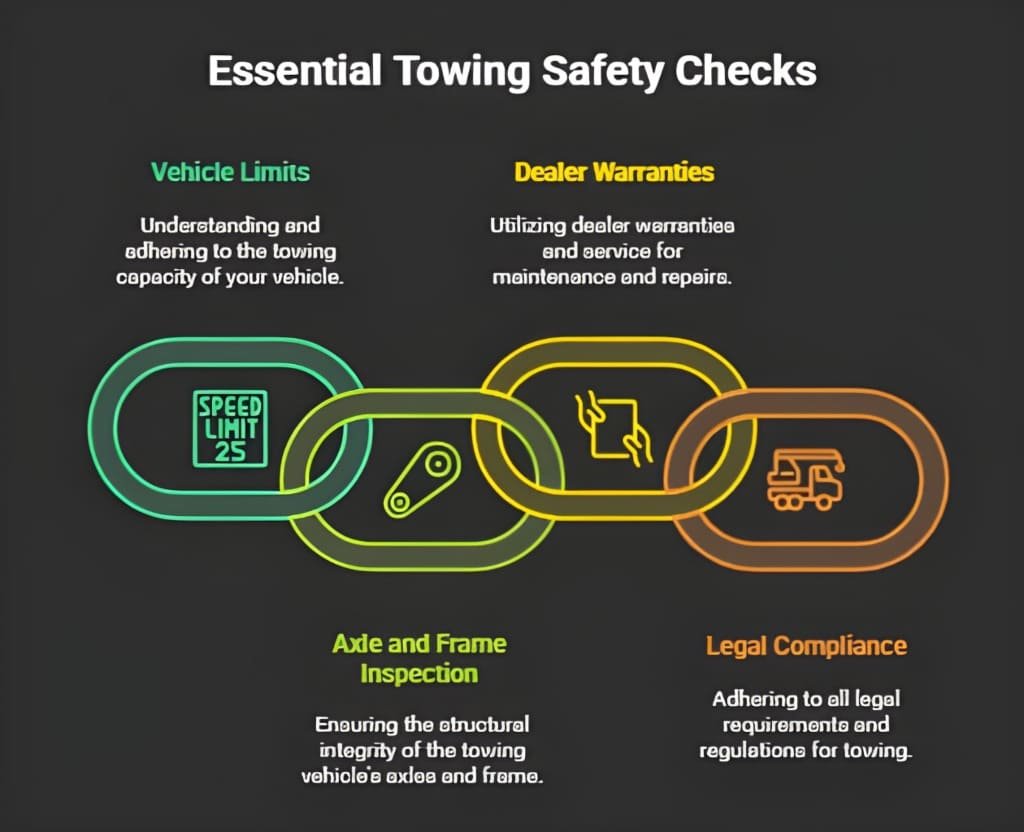
Final Thoughts
Choosing the right trailer is more than just picking a style—it’s about matching the right tool to the job. Whether you need a rugged dump trailer for construction, a livestock trailer for farming, or a sleek enclosed cargo hauler for your business, the right fit saves time, money, and stress.
At Phoenix Trailers Depot, we don’t just sell trailers—we help you find the perfect match for your industry and lifestyle. Think of us as your trusted partner on the road, guiding you toward reliable, durable, and industry-ready trailers.
Your next trailer is waiting—strong, reliable, and built for your needs. Visit Phoenix Trailers Depot today and let’s get you hitched to the right trailer!




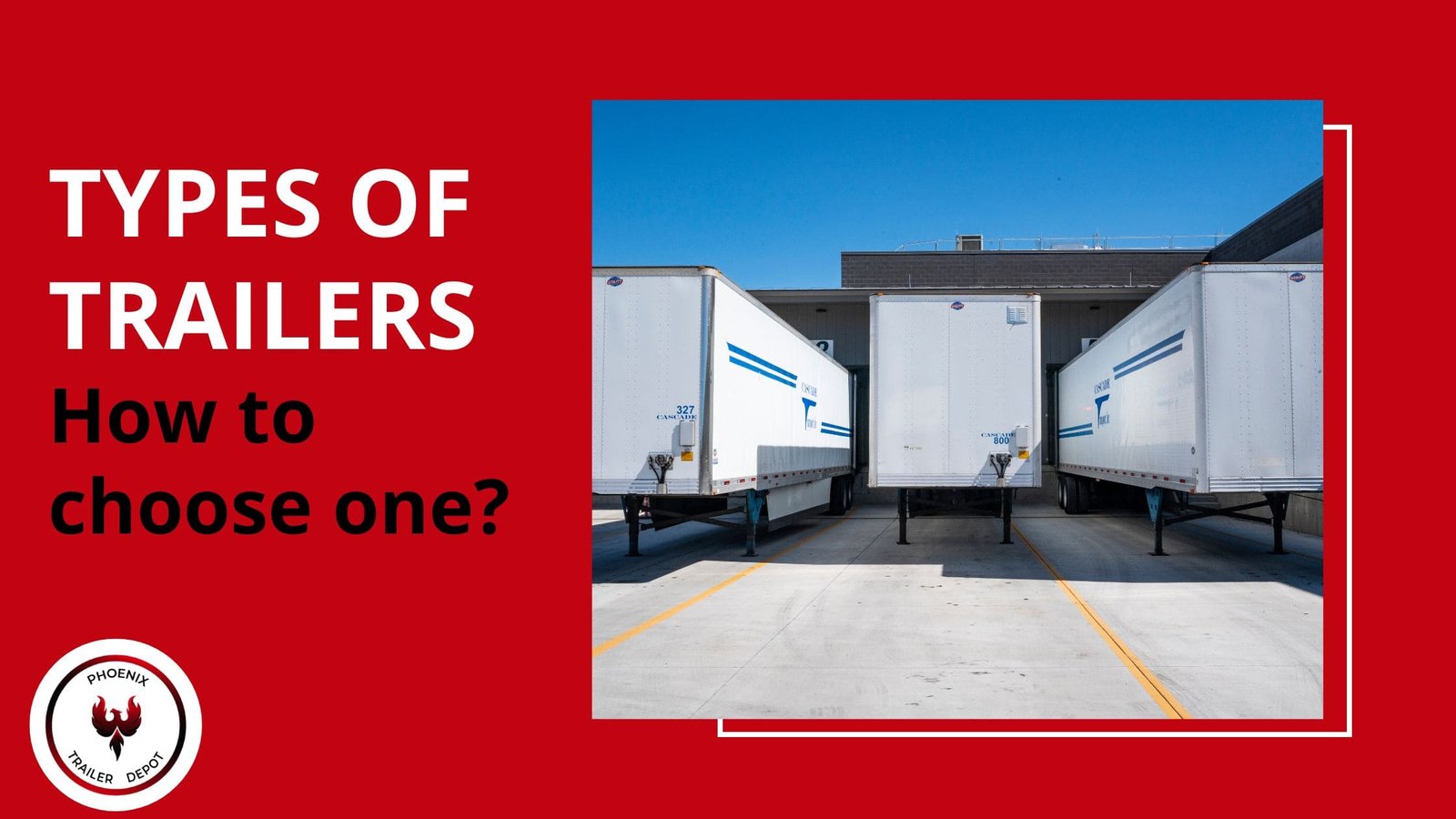
Leave a Reply